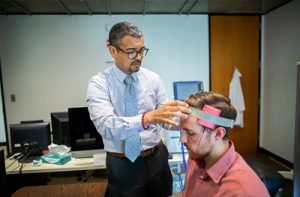 Penn’s brainSTIM center will study neuromodulation to repair and enhance human brain function
Penn’s brainSTIM center will study neuromodulation to repair and enhance human brain function
Penn Medicine has launched a new center to study the brain, one of the most complex systems in the body:
The Penn Brain Science, Translation, Innovation, and Modulation (brainSTIM) Center brings together a team of leading neuroscientists, neurologists, psychiatrists, psychologists, and engineers at Penn using neuromodulation techniques to research, repair, and enhance human brain function—the first translational center of its kind in the region.
Among the key faculty involved in this new center is J. Peter Skirkanich Professor of Bioengineering Danielle Bassett. Bassett’s Complex Systems Lab studies biological, physical, and social systems by using and developing tools from network science and complex systems theory. Bassett, along with Assistant Professor of Psychiatry Desmond Oathes, will work to:
understand how TMS [i.e. transcranial magnetic stimulation] might improve working memory in healthy adults and those with ADHD by combining network control theory (a set of concepts and principles employed in engineering), magnetic stimulation of the brain, and functional brain imaging.
Read more at Penn Medicine News.
